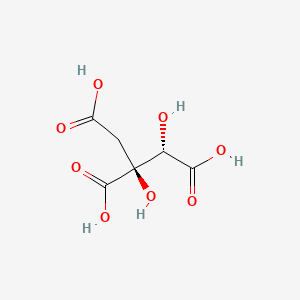m6A-centered Drug Response Information
General Information of the Drug (ID: M6APDG00950)
| Name |
(-)-hydroxycitrate
|
||||
|---|---|---|---|---|---|
| Synonyms |
Garcinia acid; 3-c-carboxy-2-deoxy-d-erythro-pentaric acid; CHEMBL118715; UNII-8W94T9026R; (1S,2S)-1,2-dihydroxypropane-1,2,3-tricarboxylic acid; 8W94T9026R; Super CitriMax HCA 600SXS; 4373-35-7; (-)-Hydroxycitrate; 27750-10-3; 7A3; Citric acid, 2-hydroxy-, (-)-; AC1Q5QYE; AC1L4H7S; (2S,3S)-3-Carboxy-2,3-dihydroxy-pentanedioic acid; SCHEMBL6773065; DTXSID20276669; ZINC1656422; BDBM50036210; LMFA01050511; AJ-28889; D-erythro-Pentaric acid,
Click to Show/Hide
|
||||
| Status |
Investigative
|
||||
| Structure |
 |
||||
| Formula |
C6H8O8
|
||||
| InChI |
1S/C6H8O8/c7-2(8)1-6(14,5(12)13)3(9)4(10)11/h3,9,14H,1H2,(H,7,8)(H,10,11)(H,12,13)/t3-,6+/m1/s1
|
||||
| InChIKey |
ZMJBYMUCKBYSCP-CVYQJGLWSA-N
|
||||
| PubChem CID | |||||
| TTD Drug ID | |||||
Target Gene(s) and Their Upstream m6A Regulator, Together with the Effect of Target Gene(s) in Drug Response
The target genes involved in drug-target interaction (such as drug-metabolizing enzymes, drug transporters and therapeutic targets) and drug-mediated cell death signaling (including modulating DNA damage and repair capacity, escaping from drug-induced apoptosis, autophagy, cellular metabolic reprogramming, oncogenic bypass signaling, cell microenvironment, cell stemness, etc.) could be regulated by m6A regulator(s) and affected their corresponding drug response. You can browse detailed information on drug-related target gene(s) mediated by m6A regulators.
ATP-citrate synthase (ACLY)
Heterogeneous nuclear ribonucleoproteins A2/B1 (HNRNPA2B1)
| In total 1 mechanisms lead to this potential drug response | ||||
| Response Summary | ATP-citrate synthase (ACLY) is a therapeutic target for (-)-hydroxycitrate. The Heterogeneous nuclear ribonucleoproteins A2/B1 (HNRNPA2B1) has potential in affecting the response of (-)-hydroxycitrate through regulating the expression of ATP-citrate synthase (ACLY). | [1], [2] | ||
Methyltransferase-like 14 (METTL14)
| In total 1 mechanisms lead to this potential drug response | ||||
| Response Summary | ATP-citrate synthase (ACLY) is a therapeutic target for (-)-hydroxycitrate. The Methyltransferase-like 14 (METTL14) has potential in affecting the response of (-)-hydroxycitrate through regulating the expression of ATP-citrate synthase (ACLY). | [2], [3] | ||
Methyltransferase-like 3 (METTL3)
| In total 1 mechanisms lead to this potential drug response | ||||
| Response Summary | ATP-citrate synthase (ACLY) is a therapeutic target for (-)-hydroxycitrate. The Methyltransferase-like 3 (METTL3) has potential in affecting the response of (-)-hydroxycitrate through regulating the expression of ATP-citrate synthase (ACLY). | [2], [4] | ||
References